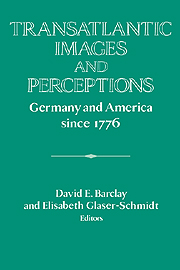Book contents
- Frontmatter
- Introduction
- 1 “Through a Glass, Darkly”: Changing German Ideas of American Freedom, 1776-1806
- 2 “Germans Make Cows and Women Work”: American Perceptions of Germans as Reported in American Travel Books, 1800-1840
- 3 Weary of Germany - Weary of America: Perceptions of the United States in Nineteenth-Century Germany
- 4 “Auch unser Deutschland muss einmal frei werden”: The Immigrant Civil War Experience as a Mirror on Political Conditions in Germany
- 5 Different, But Not Out of This World: German Images of the United States Between Two Wars, 1871-1914
- 6 From Cultureto Kultur : Changing American Perceptions of Imperial Germany, 1870-1914
- 7 The Reciprocal Vision of German and American Intellectuals: Beneath the Shifting Perceptions
- 8 Germany and the United States, 1914-1933: The Mutual Perception of Their Political Systems
- 9 Between Hope and Skepticism: American Views of Germany, 1918-1933
- 10 “Without Concessions to Marxist or Communist Thought”: Fordism in Germany, 1923-1939
- 11 The Continuity of Ambivalence: German Views of America, 1933-1945
- 12 Cultural Migration: Artists and Visual Representation Between Americans and Germans During the 1930s and 1940s
- 13 Representations of Germans and What Germans Represent: American Film Images and Public Perceptions in the Postwar Era
- 14 Chancellor of the Allies? The Significance of the United States in Adenauer's Foreign Policy
- 15 American Policy Toward German Unification: Images and Interests
- 16 Unification Policies and the German Image: Comments on the American Reaction
- Index
14 - Chancellor of the Allies? The Significance of the United States in Adenauer's Foreign Policy
Published online by Cambridge University Press: 05 January 2013
- Frontmatter
- Introduction
- 1 “Through a Glass, Darkly”: Changing German Ideas of American Freedom, 1776-1806
- 2 “Germans Make Cows and Women Work”: American Perceptions of Germans as Reported in American Travel Books, 1800-1840
- 3 Weary of Germany - Weary of America: Perceptions of the United States in Nineteenth-Century Germany
- 4 “Auch unser Deutschland muss einmal frei werden”: The Immigrant Civil War Experience as a Mirror on Political Conditions in Germany
- 5 Different, But Not Out of This World: German Images of the United States Between Two Wars, 1871-1914
- 6 From Cultureto Kultur : Changing American Perceptions of Imperial Germany, 1870-1914
- 7 The Reciprocal Vision of German and American Intellectuals: Beneath the Shifting Perceptions
- 8 Germany and the United States, 1914-1933: The Mutual Perception of Their Political Systems
- 9 Between Hope and Skepticism: American Views of Germany, 1918-1933
- 10 “Without Concessions to Marxist or Communist Thought”: Fordism in Germany, 1923-1939
- 11 The Continuity of Ambivalence: German Views of America, 1933-1945
- 12 Cultural Migration: Artists and Visual Representation Between Americans and Germans During the 1930s and 1940s
- 13 Representations of Germans and What Germans Represent: American Film Images and Public Perceptions in the Postwar Era
- 14 Chancellor of the Allies? The Significance of the United States in Adenauer's Foreign Policy
- 15 American Policy Toward German Unification: Images and Interests
- 16 Unification Policies and the German Image: Comments on the American Reaction
- Index
Summary
Foreign policy has played an exceptionally prominent role in the history of the Federal Republic of Germany since its founding. A central task of the young republic, in addition to forming a new government and rebuilding the economy, was to reestablish ties with other nations. The government of Chancellor Konrad Adenauer worked gradually and persistently to win back Germany's right to engage in foreign policy and its equal status in the international community of nations. On May 5, 1955, nearly ten years to the day after the total defeat of the Third Reich, the western part of Germany formally received its sovereignty. This victory was made possible for the most part by three interrelated elements of West German foreign policy: concentration on economic issues, even in the realm of foreign relations; a close association with the United States; and, as the central element of Germany's desired Western orientation, conciliation with its Western European neighbors, especially France. “Our stance is firm in the area of foreign policy,” stated Adenauer in a personal letter in August 1949. “It is oriented primarily toward establishing a close relationship with our neighbors in the Western world, particularly the United States. With all our energy, we will work toward the goal of having Germany admitted as soon as possible as a full member of the European federation, with all the rights and responsibilities thereof.”
- Type
- Chapter
- Information
- Transatlantic Images and PerceptionsGermany and America since 1776, pp. 309 - 332Publisher: Cambridge University PressPrint publication year: 1997



